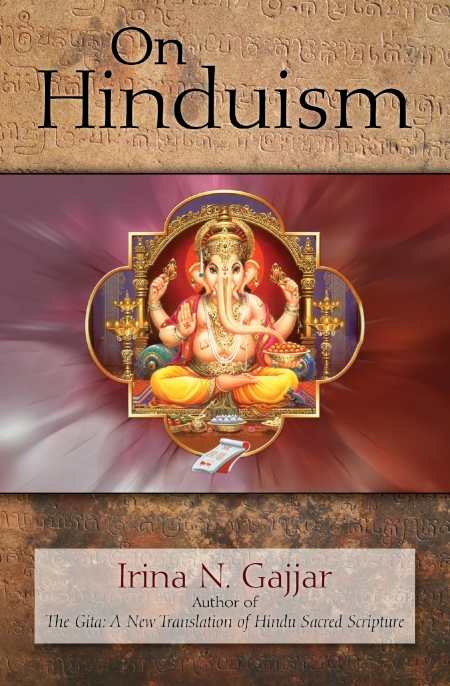On Hinduism
Engaging rather than didactic, this exploration of Hinduism’s roots enlightens readers on the essence of creativity and karma.
Irina Gajjar’s (author of The Gita, a contemporary translation of the Bhagavad Gita) On Hinduism is an inviting and concise introduction to a diverse tradition, one claimed by a billion people worldwide while remaining little understood in the Western world. Gajjar traces Hinduism to its roots, roughly contemporaneous to the introduction of Vedic culture into the Indian peninsula some 3,500 years ago. The religious system which developed over the next thousand years encompasses much, though it defies orthodoxy.
Hinduism itself, she says, holds a belief in a singular god, best understood as an overarching and creative truth, though individual Hindus may elect to forego engaging belief in a deity entirely. God, when approached in the tradition, is most often expressed via three divine attributes: creator, preserver, and destroyer. Students of religion will recognize room for ecumenism in such conceptions. Indeed, God-as-preserver, or Vishnu, was last incarnated, some Hindus say, as the Buddha, whose teachings on enlightenment and rebirth arose from Hindu thought.
Notions of God’s inscrutability, Gajjar indicates, create room for boundless creativity surrounding the absolute. Thus, the author devotes a chapter to some of the very colorful, much beloved myths which have been developed by Hindus.
This religion which resists doctrine, Gajjar shows, also defies conventions surrounding canon, though there are texts considered quintessentially Hindu. These begin with the Vedas, from which the Bhagavad Gita draws. Gajjar comments upon their composition while affording the reader glimpses of significant portions of the texts. She also gives a nod to other traditions which emerged from Vedic worldviews, including Jainism and Sikhism.
Reliance on the texts is no more requisite than a proclaimed belief in God in Hindu life, however. In subsequent chapters, Gajjar investigates other vehicles of enlightenment, from yoga to traditional pujas, or rituals. These include the festivals which many associate with Hinduism, including Holi and Diwali, and ways of attiring oneself, including the bindi. Gajjar also illumines life-cycle events, including (arranged) marriage, naming ceremonies, and rituals following death.
Beyond the rituals which punctuate a Hindu life are the behaviors and understandings around which one builds a typical Hindu day, like notions of karma and reincarnation. Gajjar fleshes such ideas out with illustrative analogies of cause and effect. Late in the book the reader encounters a connected chapter on dharma, the concept of an over-arching yet subjectively adhered to system of ethical behavior.
On Hinduism is an intellectually engaging and respectful appraisal of a complex, diverse system which tends to resist simple explanations. That Gajjar manages to communicate so much of Hinduism to the reader so neatly, and with such authorial flair, seems quite an accomplishment.
Reviewed by
Michelle Anne Schingler
Disclosure: This article is not an endorsement, but a review. The publisher of this book provided free copies of the book to have their book reviewed by a professional reviewer. No fee was paid by the publisher for this review. Foreword Reviews only recommends books that we love. Foreword Magazine, Inc. is disclosing this in accordance with the Federal Trade Commission’s 16 CFR, Part 255.

